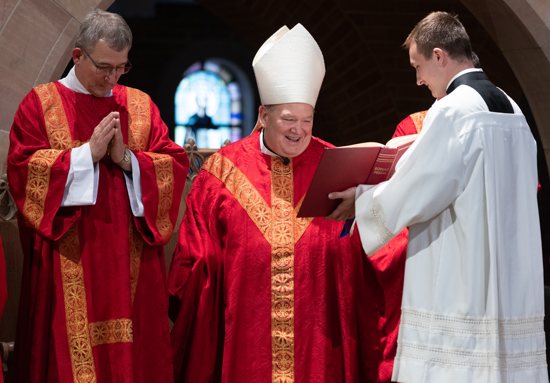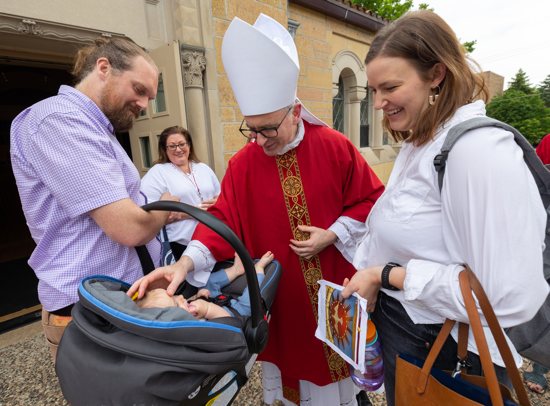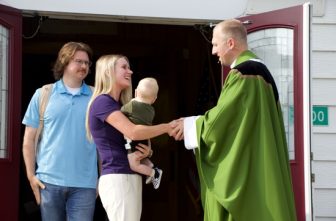
The end of the Synod Assembly in the first Archdiocesan Synod in 83 years was marked with a closing 5 p.m. Mass June 5 at the same location as the opening Mass June 3: Holy Spirit Church in St. Paul. The church is adjacent to the Synod Assembly’s main venue, Cretin-Derham Hall high school.
With Archbishop Bernard Hebda chief presider and Bishop Joseph Williams delivering the homily, about 500 delegates filled the church, most representing their parishes and some representing Catholic institutions. The delegates made their way to Mass after table discussions and voting on the last of three focus areas for the Synod: Forming youth and young adults in and for a Church that is always young. The other two focus areas were the center of activities June 4.
Archbishop Hebda welcomed all to the Mass and at its close offered his gratitude to the many people who contributed their time and gifts to making the Synod possible, from the delegates to volunteers, spouses and children of delegates, Father Joseph Bambenek, assistant director, and Therese Coons, director of the Synod, as well as members of the Synod executive committee and prayer group, and the priests who concelebrated the Mass, Father Daniel Haugan, pastor of Holy Cross, and more.
Bishop Williams began his homily noting the great blessing to be in the Church of the Holy Spirit on the feast of Pentecost. While that may be providential, what is not part of God’s providence is that the Synod is happening on the feast of Pentecost, he said. That was the clear design of Archbishop Hebda, he said.
Doing so shows that the key to implementing “all the hopes that we’ve expressed in these past days is in this mystery,” Bishop Williams said, the mystery of the Holy Spirit. Before he ascended into heaven, Jesus said “you’ll receive power when the Holy Spirit comes to you,” Bishop Williams said. “What is that power? … ‘And you will be my witnesses.’”
The power to witness is the true power of the Church, Bishop Williams said.
Being Christians, first of all, is bearing witness to Jesus, and this is what the apostles did, Bishop Williams said. “And this is why Christianity spread throughout the world. It’s not about money. It’s not political influence. It was a group of humble people convinced that Jesus was raised from the dead, who received the fire of the Spirit. And they converted one of the greatest empires in the history of the world.”
“… I think that’s why our archbishop brought us to this place, this upper room,” Bishop Williams said.

After three days of prayer, presentations and discussions, Synod delegate Jerry Buchman, a parishioner of St. Michael in Stillwater, said he was impressed with how well organized the Synod Assembly was, from beginning to end. He could see the hard work that went into it and said he was impressed with the engagement of “our bishops and the leadership team.”
Buchman, 52, who works as a manager in information technology, said it was obvious that a lot of prayer went into the Synod process and he found it genuine. “(The) archbishop is a true shepherd who wants to shepherd us forward,” he said.
Buchman said with the Synod’s close, he looks forward to greater collaboration within the whole archdiocese and a greater understanding by all parishioners that “our local Church is the archdiocese, not our individual parish, and that the work within parishes is to serve the Church, to serve each of our brothers and sisters, those who are Catholic and not Catholic, because the archbishop … wants to be a good shepherd for us.”
Delegate Anne Cullen Miller, president of St. Paul-based Catholic Community Foundation of Minnesota, said her overwhelming thought on the Synod was that the Holy Spirit was present. “You could just feel individuals, including myself, moved by it,” she said. “There was an unbelievable, unexplainable vibe in that whole room.”
Several people said June 4 was a long day but it went by quickly, said Cullen Miller, 59, a parishioner of St Joseph in West St. Paul. It was “an easy, wonderful day” with good, rich conversation and people truly listening to each other, with some minds changed in the course of a discussion, she said.
“There was a lot of learning and a lot of engagement,” Cullen Miller said, “and, I think, a lot of community building.”
Cullen Miller said she hopes next for solid execution of the fruits of the Synod, first in a pastoral letter from Archbishop Hebda in November, then an action plan from the archdiocese. With that, “we can come together as a local Church,” she said. But “we won’t be able to do anything unless everyone comes together and brings energy and this renewed hope to restore and grow our local Church,” she said.
She believes some structural change in the way mission and ministry are advanced is needed, and she believes some of that will happen. Cullen Miller hopes “we’ll find ways the Holy Spirit won’t abandon us after the Synod closes and that we’ll be moved to sort of modernize our approach to advancing ministry and evangelizing.”
The topic of evangelization was embedded in everything discussed, Cullen Miller said. “That’s the ultimate goal of everything.”
Delegate Maddie Aspholm, a parishioner of St. Stephen in Minneapolis and stay-at-home mom, said the Synod required work from planners and participants. Unlike a typical nine-to-five job, she said being a Synod delegate required the whole heart, too, engaged the mind “and forced us to really think beyond just our individual parishes.”
Aspholm, her husband, Jim, and their 8-month-old daughter, Sadie, who was baptized by Bishop Williams, are parishioners of St. Stephen in Minneapolis.
She said she felt the Synod was well organized, it ran smoothly with clear and coherent talks and guidelines for leading table discussions. “I was really pleased with how differing opinions were expressed, but still received with graciousness and love,” she said.
Aspholm said she hopes Archbishop Hebda and Bishop Williams continue to listen to the Holy Spirit as they consider what should arise out of the Synod Assembly, and ask the Lord’s guidance for the archdiocese. “And that there would be an openness on behalf of parishes across the archdiocese to implement them,” she said. “My great hope is for openness because I think some of the resolutions that came forward might surprise people,” Aspholm said. “But it’s all inspired by God, it’s inspired by the Holy Spirit, so we can trust that we’re in good hands and parishioners across the diocese will be open to saying yes to that.
Delegate Andrew Frenz, a parishioner of Our Lady of Peace in Minneapolis, said one thing that struck him during Synod Assembly small group discussions was the diversity in perspectives. Frenz said he prayed about the many propositions and his heart centered on one or two he felt were very important. But through discussions with five or six others, his eyes were opened as to how and why others prioritized different ones.
Through discussions with people from various parishes and at varying points in life, the delegates gained “a really well-rounded set of inputs into the process,” Frenz said.
Frenz, 36, a software engineering manager, said he hopes that for the Synod going forward as an archdiocese and as parishes, “we’re essentially able to paint a vision for the future that is significantly big enough.” He said “imagine the news articles, The Catholic Spirit articles that would be written about the transformation in our archdiocese,” the fullness, the richness and the transformation that can occur, so that people are dreaming big enough, aiming for something big, and can then work backwards from that and say, “‘if that’s where we want to get in three years, if that’s where we want to get in five years, what do we have to do today, tomorrow, in the next year?’”
“Where do we need to be in our journey to make significant progress toward that?”
Frenz said his greatest fear is that “we’re too incremental in our thinking that, ‘let’s do one or two or three little things better,’” he said. “And we don’t actually get to a point where a big impact or huge transformation has occurred.”
Frenz believes the archdiocese has in front of it the potential for that “really huge transformation.”
“But we need to think big enough, open up our hearts and our minds to what God’s calling us to, just a radically improved future, so that we can actually try to accomplish it,” Frenz said.




